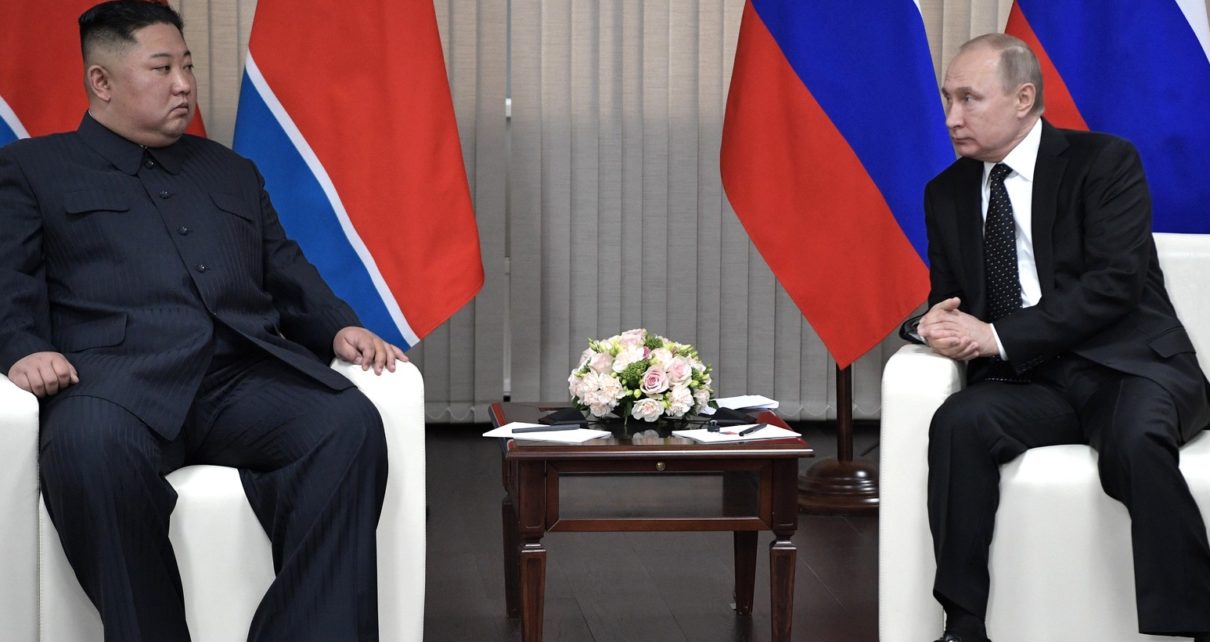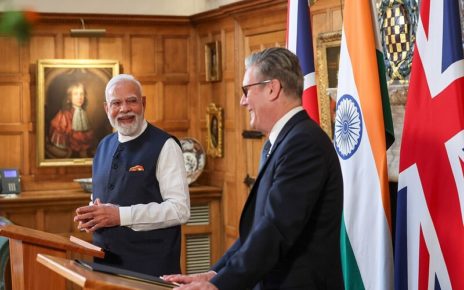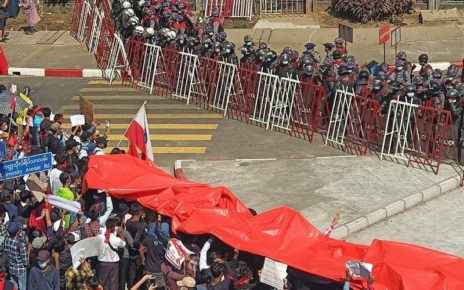As Russia experiences growing isolation since its invasion of Ukraine, Moscow has sought to deepen its relationship with the Democratic People’s Republic of Korea (DPRK). This relationship, which had previously collapsed with the Soviet Union’s dissolution in 1991, has witnessed a prominent resurgence. The new relationship is marked by secrecy and mutual assistance aimed at circumventing both countries’ respective sanctions and cooperating on military arms and technology. This article delves into the burgeoning bilateral ties between Russia and the DPRK, exploring the dynamics of their collaboration and the implications for regional and international stability.
The relationship between the two rogue states, Russia and the DPPK, has experienced a revitalization symbolized by a summit between Kim Jung Un and Putin in September 2023. With Russia increasingly isolated from the international system and fighting a desperate war of attrition against Western-backed Ukraine, Moscow has sought out Pyongyang as a critical source of munitions and arms. This partnership also aligns with the DPRK’s isolation, which resulted from the UN Security Council’s 2006 arms control sanctions, 2017 sanctions on importing oil for violating nuclear weapons tests, and a stagnant economy. Due to sanctions, the DPRK has had limited ability to import oil and petroleum products, as well as export its products, which have largely been criminally linked. This has resulted in social and economic turmoil in North Korean regions, most witnessed during the pandemic. Economic and technological vulnerabilities have prevented Pyongyang from focusing on its principal concerns, maintaining a lifestyle for its elites, enhancing its military and strategic capabilities, and unification with South Korea. Moreover, the DPRK is motivated to foster a closer relationship with Russia to diversify its overdependency on China and its imports. Through a collaborative relationship with Russia, Pyongyang can secure critical energy products to potentially achieve regional industrial capacity through the 20X10 policy initiative and enhance and maintain its military readiness. All of this could provide Pyongyang with the capacity to create regional instability and serious security implications for the United States, South Korea, and Japan, as well as create further complications for China.
Since the historic meeting between Kim and Putin in September 2023, there has been evidence of heightened activity at a North Korean rail facility bordering Russia, suggesting a significant increase in trade. Analysts at CSIS suggest this meeting generated a military-technical cooperation agreement between the two rogue states. Newer reports by the South Korean defence minister, Shin Won-sik, indicate that there have been nearly 7,000 containers with millions of rounds of 152mm and 122mm artillery shells transported from North Korea to Russia. For context, if the DPRK sold these artillery shells to Russia for $1,000-3,000 each, that would represent between 10-30% of North Korea’s GDP, according to Bloomberg calculations. This supply of ammunition from North Korea feeds Russia’s shell hunger, as its own supply cannot meet its demand and usage on the battlefield in Ukraine. Moreover, Russia has reportedly used short-range ballistic missiles that have been sourced from North Korea. South Korean defence officials have remarked that Ukraine has become a test site for North Korea’s nuclear-capable missiles, which could further exacerbate security concerns in East Asia and across the Pacific.
Russia has provided North Korea, which is deeply isolated internationally and faced with internal economic turmoil, a lifeline. Moreover, this relationship has provided Pyongyang with the means to diminish its dependency on China, increase its domestic industrial capacity, and enhance its military capabilities. Analysts speculate that North Korea has received and expects advanced technology from Russia in return for providing munitions and missiles. The White House’s Mira Rapp Hopper, the U.S. top advisor for the Korean Peninsula, has said the DPRK expects “… fighter aircraft, surface-to-air missiles, armoured vehicles and ballistic missile production equipment or materials, as well as advanced technology.” Analysts at CSIS have also suggested this partnership is undermining UN nuclear proliferation efforts when the partnership has borne fruit for North Korea, with Russia’s assistance in successfully helping North Korea launch its military reconnaissance satellite in November 2023 and Russian space collaboration. This is alarming, as the prospect of North Korea attaining a fully functional military satellite capability with Russian assistance raises concerns about its potential to acquire real-time intelligence on U.S. and South Korean military activities.
The ongoing war in Ukraine has provided North Korea with a strategic distraction to ramp up its weapons testing against its adversaries, thereby allowing it to break its growing isolation from the international community with Moscow’s help. Beyond symbolic gifts from Russia, including a luxury limousine from Putin, North Korea is reportedly receiving much-needed food and economic aid from Russia, including oil and petroleum products, with reports of over 9,000 containers entering North Korean ports from Russia. The importation of sanctioned products, such as petroleum, violates UN Security Council sanctions that tightly cap the country’s energy imports. The influx of energy imports has enabled North Korea to expand its military training activities, as evidenced by increased drills observed by South Korea in January and February. Moreover, Russia has moved to protect North Korea at the UN by vetoing a UN panel’s mandate to monitor compliance with international sanctions on North Korea, effectively undermining a central pillar of the sanctions regime. This shows Russia’s growing animosity toward the United States and its increasing rogue status in international stability.
The deepening relationship between Russia and the DPRK represents a significant shift in geopolitical and regional stability, with far-reaching implications for South Korea, Japan and the United States. As Russia faces escalating isolation following its invasion of Ukraine, it has turned to rogue states such as North Korea as a critical source of munitions and arms, while Pyongyang, in turn, seeks to attenuate its dependency on China, build its regional industries, and critically, bolster its military and strategic capabilities. This partnership, however, has been marked by secrecy and mutual assistance and can be categorized as reciprocal desperation. The collaboration between these two rogue states not only undermines global non-proliferation efforts, which Russia claims to adhere to, but it also violates UN Security Council sanctions that it has signed onto as well. As the DPRK leverages its position as a pariah state outside of the rules-based international order and the Russia-Ukraine war as a distraction to expand its weapons testing, the international community faces a major challenge of mitigating the residual destabilizing effects of this burgeoning partnership. Efforts to address these challenges must involve a robust diplomatic engagement and a coordinated approach to uphold international norms and security, even with powers such as the People’s Republic of China.
Photo: “Kim Jong-un and Vladimir Putin” (2019), via Wikipedia Commons. License under C.C 4.0
Disclaimer: Any views or opinions expressed in articles are solely those of the author and do not necessarily represent the views of the NATO Association of Canada.




